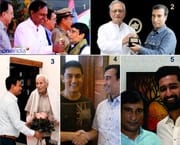Dr. Suresh Kumar Mishra ‘Uratript’
Dr. Suresh Kumar Mishra, known for his wit and wisdom, is a prolific writer, renowned satirist, children’s literature author, and poet. He has undertaken the monumental task of writing, editing, and coordinating a total of 55 books for the Telangana government at the primary school, college, and university levels. His editorial endeavors also include online editions of works by Acharya Ramchandra Shukla.
As a celebrated satirist, Dr. Suresh Kumar Mishra has carved a niche for himself, with over eight million viewers, readers, and listeners tuning in to his literary musings on the demise of a teacher on the Sahitya AajTak channel. His contributions have earned him prestigious accolades such as the Telangana Hindi Academy’s Shreshtha Navyuva Rachnakaar Samman in 2021, presented by the honorable Chief Minister of Telangana, Mr. Chandrashekhar Rao. He has also been honored with the Vyangya Yatra Ravindranath Tyagi Stairway Award and the Sahitya Srijan Samman, alongside recognition from Prime Minister Narendra Modi and various other esteemed institutions.
Dr. Suresh Kumar Mishra’s journey is not merely one of literary accomplishments but also a testament to his unwavering dedication, creativity, and profound impact on society. His story inspires us to strive for excellence, to use our talents for the betterment of others, and to leave an indelible mark on the world.
- Honoured with ‘Shrestha Navayuvva Rachnakar Samman’ by former Chief Minister of Telangana Government, Shri K. Chandrasekhar Rao.
- Honoured with Oscar, Grammy, Jnanpith, Sahitya Akademi, Dadasaheb Phalke, Padma Bhushan and many other awards by the most revered Gulzar sahab (Sampurn Singh Kalra), the lighthouse of the world of literature and cinema, during the Sahitya Suman Samman held in Mumbai.
- Meeting the famous litterateur Shri Vinod Kumar Shukla Ji, honoured with Jnanpith Award.
- Got the privilege of meeting Mr. Perfectionist of Bollywood, actor Aamir Khan.
- Meeting the powerful actor Vicky Kaushal on the occasion of being honoured by Vishva Katha Rangmanch.
Today we present his satire Where Trees Were Promised and Titles Were Planted.
☆ Witful Warmth# 51 ☆
☆ Satire ☆ Where Trees Were Promised and Titles Were Planted… ☆ Dr. Suresh Kumar Mishra ‘Uratript’ ☆
In the dust-choked lanes of a forgotten village in Champaran, where only electoral drizzle now refreshes the thirst of hope, once sprouted a noble seedling: the Janhit Utthan Parishad. This was not an institution born of lobbying or LinkedIn connections, but of a frail old teacher—Masterji—who traded his only piece of ancestral land, not for stock options, but for the betterment of the village. Back when devotion had not yet been gobbled up by dopamine-fueled selfies, and when sacrifice did not need hashtags to go viral, Masterji dared to dream of a platform that would channel rivers of altruism. That sacred shrine of public service has now been annexed by a mob of sweet-toothed contractors who flock not to serve but to be served. The walls that once echoed with his maxim, “An institution is a temple of service,” now display laughing faces on election posters. Mahatma Gandhi still hangs there, though rumor has it he occasionally mutters, “Hey Ram! What calamity is this?”
Where once sat councils of virtue—discussing education, sanitation, and green revolutions—the institution’s meetings have been demoted to exhibitions of egos and necktie knots. One fine day, as though an old transistor caught a rogue frequency, ten members stood up simultaneously and cried, “The institution is sinking!” One might have mistaken it for the Titanic’s final scene, had it not been accompanied by the chairman’s candy-store smile. And like a comic twist in a political reality show, the solution proposed was not reform in intent or action, but reform in titles—new president, new vice president, and a minister to complete the trilogy. As if governance was a talent hunt and the prize was a gilded armchair. Not a whisper on principles, but a stampede for positions. Somewhere in the cracked plaster behind Masterji’s garlanded photo, his spirit may well have headbutted the wall.
Gone are the days when meeting agendas brimmed with purpose—children’s education, cleaning of the village pond, and planting of trees. The modern meeting resembles a wedding procession, without the bride. Chairs line up like anxious guests; speeches rain down like confetti, but the issues are conspicuously absent. The only mission now is the mission to capture a better camera angle. The guiding philosophy has been replaced with an inventory of chairs. One veteran, his eyes moist with betrayed faith, whispered, “We used to plant trees; now we plant titles.” This from a man who once pledged his pension to the cause, now left to admire the president’s gold chain while peering into an empty treasury register.
The annual celebration—once a festival of soil and saplings—has transformed into a carnival of banners, drums, and declarations. “Fifty trees planted this year!” the president announced, and the crowd clapped like metronomes. Meanwhile, the village searched for a single sprout. Neither pit nor plant could be found. The trees had evidently taken root in reports, watered and nourished by budget files. A trophy followed—“Best Environmentalist”—handed to the chairman, who stepped up and declared, “Our institution is the mother of society!” A child in the crowd innocently quipped, “Then why does she feel so stepmotherly?” Ah! There lies the whole tale—this mother no longer nurtures, she merely poses.
The institution’s social media handles now read like a satire on benevolence. The same leader, the same cap, the same posture—ad infinitum. Old-age homes became backdrops for photo ops. Fruits were ‘distributed’—or rather, made to hover before the lens—while the elders received smiles more than sustenance. One old man chuckled, “Son, they didn’t give us fruit; they just clicked pictures and vanished.” And thus, the institution transitioned from a service mission to a lighting studio, where emotion was the wallpaper and the spotlight reserved for faces, not causes.
As the curtain drew further, original members were either retired with ceremonial garlands or systematically muted like unwanted tabs on a browser. Masterji, once a living manual of integrity, now only grins from his dusty frame. His grandson once asked, “Grandpa, what does your institution do now?” He sighed and replied, “It’s no longer an institution, son. It’s a flea market for chairs.” The PR firm has taken over the spirit, and truth, it seems, has taken a long vacation. Masterji no longer speaks from the dais; he speaks from the frame. A relic of a time when service was the language of the soul.
Eventually, under the theatrical name of ‘restructuring,’ the institution quietly dissolved itself. No drums, no slogans, just a withered meeting where Masterji’s photo received its final garland. A crack ran down the wall, and those nearby claim they heard a voice whisper, “I created this for service. You used it for selfies.” The institution that once irrigated the barren fields of Champaran with hope has itself turned barren. Now, its tale is preserved in one corner of a modest library, in a frail diary’s final line: “There’s only one letter’s difference between service and power—but the intent is separated by a thousand miles.”
****
© Dr. Suresh Kumar Mishra ‘Uratript’
Contact : Mo. +91 73 8657 8657, Email : drskm786@gmail.com
≈ Blog Editor – Shri Hemant Bawankar/Editor (English) – Captain Pravin Raghuvanshi, NM ≈








